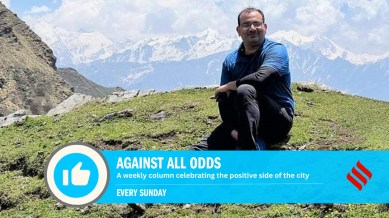Click here to join Express Pune WhatsApp channel and get a curated list of our stories
Against All Odds: Wheelchair-bound at 20, COEP topper and national tennis player from Pune turned his life around with sheer willpower
Today Amit Bhargava is the vice-president of a firm dealing with the biofuel supply chain, a single parent, and an avid mountaineer.

The third year of college is a crucial time in a student’s life. It is when one decides the course of one’s career, from taking up internships to shortlisting universities and so on. For Amit Bhargava, this year was a game-changer in more ways than he had bargained for.
Always a merit-list student, Amit studied at COEP Technological University from 1998 to 2002 after finishing school at Loyola, Pune. His academic brilliance was well-matched by his sporting prowess as Amit played lawn tennis and represented his school and the Pune University in the National Games, where he bagged bronze and silver medals. In 2001, he was adjudged the best hockey player even as he was the captain of his college tennis team.
monthly limit of free stories.
with an Express account.
Besides, Amit was a footballer. And it was during one of his football matches at the Army Institute of Technology in Dighi that the 20-year-old suddenly collapsed on the field in February 2001. It was a paralytic stroke. “It paralysed the entire right side of my body, my face, hands and legs,” he says.
Recalling the day, Amit’s father Pradeep Bhargava says, “He was on the football ground in the afternoon, a very fit boy, suddenly horizontal on the hospital bed at the end of the day. His hands and legs were just there, no movement. I kept hoping that the doctor would come out and say this is temporary.”
Out of nowhere, Amit’s life changed from a busy college schedule of lectures, sports sessions and hanging out with friends to the beginning of a long, laborious and lonely struggle. The determined youth, however, decided to start by promising himself that he would not wallow in self-pity.
He was in the hospital for about 12 days. “Since my entire right side was affected, I started off on a wheelchair and got onto a walker and then switched to a stick,” he recounts. About five months later, he also started doing aqua aerobics to regain his movement.
But the physical recovery was not the toughest part of the journey. “From being an active sportsperson, it came down to zero activity. I couldn’t step out of the house. I first had to get mentally in tune with what had happened, a process in which my friends and family helped a lot. Some also grew distant, which helped me understand who my true friends were,” says Amit, who decided to attend lectures and appear for his exams. “I was on medication, which made me very sleepy and I had trouble concentrating. I would study for half an hour and then give my mind and body some rest,” he said.
Even then, he still could not write. So Amit got a writer, appeared for three semester exams and still bagged distinction. “It is one thing to dictate for subjects like English and History, but with engineering graphs and equations it is very tricky,” Pradeep adds. In the meantime, Amit started training himself to write with his left hand, which is now his dominant hand.
“After the stroke, there was no movement in the right side and that part of the brain also got affected, blood flow stopped there and it effectively became dead. So the recovery lay in training the surrounding parts of the brain to do all the activities I was used to,” explains Amit.
After engineering, he appeared for an interview for a leading IT firm in Pune. “But my speech was slurred, I wasn’t confident while talking to people. It added to the overall feeling of wanting to give up,” he recalls. Nevertheless, he bagged the job and went on to work there for two years, rebuilding his confidence during the period.
Amit had by then given up on his dream of studying abroad, but physiotherapy helped him strengthen the right side of his body and he started to experiment with sports again. “I started playing a little bit of tennis, a year or two after the stroke. But I wasn’t able to play well, so I moved to table tennis, then badminton.”
After two years at the IT company, Amit decided to pursue an MBA. He appeared for the entrance, wrote it with his left hand and felt confident to move to Delhi after he secured an admission. Pradeep recalls, “He stayed in the hostel on his own, topped the course, and even went to Singapore through the college. In Singapore, he did bungee jumping! But called to tell me only after he had done it,” says Pradeep, beaming with pride.
Once he was back in India, Amit’s life began to look up and he met Minu. From colleagues, the two became a couple and got married in 2008. Two years later, they had a daughter, Suhani. Just when everything seemed set, Minu passed away in 2017, forcing Amit to dip once again into his deep reservoir of strength to overcome the blow.
Today, at 43, Amit is the vice-president of a company dealing with the biofuel supply chain. The single parent is also a mountaineer who goes trekking to the Sinhagad fort once a week and has already completed three Himalayan treks.
“It wasn’t easy because of the instability. There is always that little extra struggle. But then life is unpredictable. It is important to have an open mind when things change. The sooner you adapt, the better it is,” Amit says.
Click here to join Express Pune WhatsApp channel and get a curated list of our stories